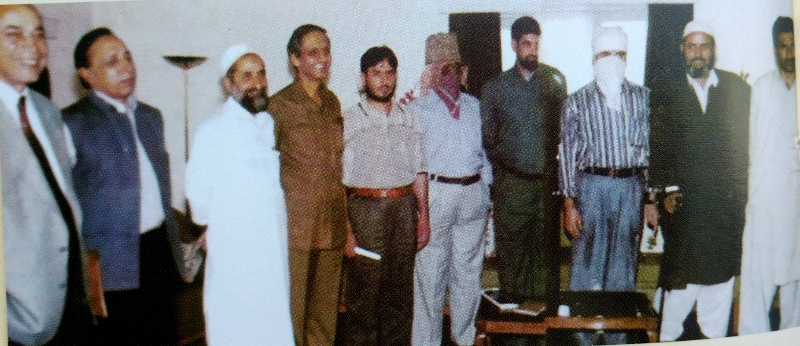
Majid Dar led by Fazl Haq Qureshi with the then union home secretary Kamal Pande .Pic courtesy (Kashmir The Vajpayee Years )
The recent halt in operations announced by the Delhi has garnered widespread scepticism with both politicians and political experts terming the announcement as ‘futile.’
Chief minister Mehbooba Mufti had suggested a Vajpayee type Ramadhan unilateral ceasefire like the one of 2000. It was accepted by the Centre but with conditions.
Far from her claim, is there any similarity between the ceasefire of the year 2000 and the present halt in security operations by the New Delhi?
Even if both the halting of operations were announced in the month of Ramadaan, the year 2000 ceasefire was announced by the militant organisations unlike the present one.
In early 2000, the then Prime Minister Atal Bihari Vajpayee had accepted a proposal by the Hizbul Mujahidin for a unilateral ceasefire to halt the cycle of violence in the Kashmir Valley.
Following that, the former Prime Minister had announced that beginning November 26 government forces operating in Jammu and Kashmir would cease offensive operations for the duration of the holy month of Ramadan.
Popularly known as the “Ramadan cease-fire,” it was extended thrice until it was finally withdrawn on May 23 that year.
The announcement was accompanied by an invitation to then Pakistan President Pervez Musharraf to visit India for talks.
The Ramadan cease-fire and other subsequent developments then had elicited strong and diverse reactions.
In its response to the announcement, the militant group Hizbul Mujahidin later set three conditions, including that of Pakistan’s inclusion in tripartite talks before reciprocating to the offer by the Indian government.
“Hizb would also like to see Indian troops being pulled back by New Delhi and the release of all freedom fighters made captives by the Indian government,” Hizb chief Syed Salahudin had said.
Today after 18 years and as the Centre once again announced a ceasefire, those who were at the centre of it then say that all parties, including the armed groups need to be taken into confidence.
Chairman Jammu Kashmir Salvation Movement Zaffar Akbar Bhat, who was one of the commanders holding parleys with Goverenment of India (GOI) in 2000, believes that the Delhi should have done more ground work and involved all the main players in the ceasefire by conducting Track II diplomacy first.
He also pointed out that the main difference between the ceasefire of 2018 and that of 2000 was that armed groups were directly involved in the latter.
“In 2000, we declared a ceasefire and indulged in talks with the Indian government. However, nothing of that sort happened this time,” Bhat said.
A source privy to the negotiations of the 2000 ceasefire says that the ceasefire was successful mainly because it was initiated by militant groups, and the Government of India had instantly accepted the offer.
“Militants even played a cricket match against the army in Kupwara,” source said.
Talking about the whole process, he said;
“Militants came from across the border and that included top commanders like Majeed Dar and four others. Hurriyat leader Fazl Haq Qureshi acted as a mediator.”
Talking about the turnaround of events then, source said that there was a meeting held between militants and the other side at the Nehru Guesthouse.
“The main aim of the meeting was for militant groups to be accepted as a party to the dispute,” source said, adding, that soon there was negative fallout over the whole process, as pro religious groups in Pakistan turned against the ceasefire and called it surrender.
Source further said while Pakistan supported the offer, militant groups like Laskhar-e-Toiba and some other parties turned against the ceasefire, and Salahudin who was in the loop all the while had to finally withdraw.
“He was pressurized by pro Kashmir religious parties, including the Jamaati Islami and had to finally give in,” source added.
Zaffar Akbar Bhat, however said that the ceasefire of 2000 failed because India did not accept the demands made by the Hizbul Mujahidin,that included accepting the militant group as a liberation army till the dispute was settled, “Accept Kashmir as a dispute, repeal the draconian armed forces special powers act (AFSPA) and involve Pakistan in the talks. All these demands were rejected by India, which lead to failure of ceasefire,” he said
Later, those involved in the talks were either expelled or mysteriously killed.
Majeed Dar and Farooq Mirchan were killed while as others were expelled. Moreover, there were also rifts in Azad Kashmir among militant ranks.
Drawing comparisons with today’s ceasefire, a source said that the impact seems good on the ground.
“No major attack has been carried out by militants, as they have suffered a great deal over the past few months,” he said.
Source said that all top commanders of the Burhan group have been killed, and in a way, it is good for militants to have a breather.
However, Political Science Professor Noor Baba believes that India has lost its ground in Kashmir and now by offering the ceasefire, they are trying to rebuild it, “They are trying to bring people of Kashmir into confidence, which is not possible this way. The main issue is to resolve the Kashmir dispute by sitting together on one table,” he said
Adding that he was not sure whether it will have any impact on the ground level, as after the statement came, the militant outfits completely rejected the ceasefire and termed it as “drama.”
